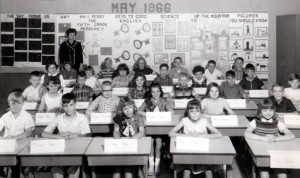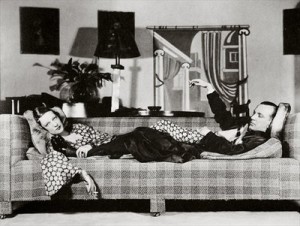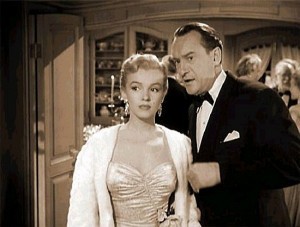When I was a youngster, I played in my high school’s band and orchestra, sang in two different choirs, took violin and piano lessons after school, acted in plays and musicals, went to classical concerts and movies like 2001: A Space Odyssey and Franco Zeffirelli’s Romeo and Juliet, checked out as many books as I could haul home from the public library every week, and got perfect grades every quarter. Had there been a dance company anywhere near Smalltown, U.S.A., I’m sure I would have faithfully attended its performances as well.
 Since I also wore thick glasses and was worse than hopeless at team sports, this was more than enough to brand me as different—way different—in the eyes of my fellow students. Most of them were perfectly nice about it, but a few accused me of being a “mama’s boy” and, worse yet, a “sissy.” To the first accusation I had no plausible defense, that being exactly what I was, but I couldn’t understand why anyone would call me a sissy, since I wasn’t girlish, just…different.
Since I also wore thick glasses and was worse than hopeless at team sports, this was more than enough to brand me as different—way different—in the eyes of my fellow students. Most of them were perfectly nice about it, but a few accused me of being a “mama’s boy” and, worse yet, a “sissy.” To the first accusation I had no plausible defense, that being exactly what I was, but I couldn’t understand why anyone would call me a sissy, since I wasn’t girlish, just…different.
My best friend wasn’t a sissy, either, but he was what I would learn later on to call “campy,” enough so that I thought of him long after the fact when I saw Clueless, in which one of the characters is described by an acquaintance as “a disco-dancing, Oscar Wilde-reading, Streisand ticket-holding friend of Dorothy.” By then I understood what that string of signifiers signified, and it had been no surprise to me when I learned that my friend had died of AIDS, any more than it had surprised me to hear a few years earlier that he was running an antique shop in New England. The last time I’d seen him, he’d boasted to me of being pals with Roslyn Kind. To my credit, I didn’t laugh in his face, though I wasn’t yet fully attuned to the pathos of claiming such a friendship as a distinction.
Needless to say, I didn’t know much about homosexuality in high school. I was attracted to women, not men, so I basically took it for granted that I wasn’t One of Those. On the other hand, I seemed to like all the other things that gay men liked—and that scarcely any of my other male classmates liked, so far as I could tell—which led me to wonder for a brief time whether my cultural tastes might possibly be indicative of some deeper-seated departure from the small-town norm. I soon figured out that my father was also wondering the same thing about me, though I eventually put his doubts to rest by becoming a jazz musician, which he took to be definitive proof of my normality. (I’m glad he didn’t live long enough to read what I wrote about Billy Strayhorn in Duke!)
As for my own short-lived concerns, they’d long since been dispelled by unambiguous evidence of a point of view summed up by one of the characters in Kingsley Amis’ Girl, 20:
What about turning queer? you say to yourself. Plenty of facilities, these days highly respectable, pleasant companions, comparatively inexpensive. And a prick is a splendid thing, and a splendid idea as well. It strikes you. The trouble is that in every case it’s got a man on the end of it. Which I’m afraid puts paid to it as far as I’m concerned.
 No doubt it says something significant about me that I’ve preferred the company of women, straight and gay alike, for as long as I can remember, both as romantic partners and as everyday companions. Be that as it may, I’ve never been able to shake off the strong sense of isolating strangeness that I acquired right around the time I discovered that I was the only kid on my block who could do an even halfway passable imitation of Noël Coward introducing Marlene Dietrich at the Café de Paris in 1954.
No doubt it says something significant about me that I’ve preferred the company of women, straight and gay alike, for as long as I can remember, both as romantic partners and as everyday companions. Be that as it may, I’ve never been able to shake off the strong sense of isolating strangeness that I acquired right around the time I discovered that I was the only kid on my block who could do an even halfway passable imitation of Noël Coward introducing Marlene Dietrich at the Café de Paris in 1954.
Complicating matters still further is the comically self-evident fact that I’m not even slightly campy and never have been. When I told Mark Morris that Paul Moravec and I were turning The Letter into an opera, he let out one of the loudest hoots I’ve ever heard. “Two straight guys writing a Bette Davis opera?” he brayed. “And you’re one of them? That is too weird.” And while another acquaintance assured me around the same time that I have a “gay sensibility,” the scatter plot of my taste isn’t nearly tight enough to make such a claim plausible. What kind of guy loves Stephen Sondheim and John Wayne?
 Nevertheless, that’s the kind of guy I’m, a straight-as-a-stick small-town boy who grew up to become a big-city drama critic, a profession whose best-known fictional representatives, Addison DeWitt and Waldo Lydecker, aren’t exactly butch—though both of them at least purported to be straight, convincingly in one case, less so in the other. And what of it? I’ve lived long enough to learn that human beings are vastly more complicated than I ever suspected in my youth, in ways not limited to their sexual preferences.
Nevertheless, that’s the kind of guy I’m, a straight-as-a-stick small-town boy who grew up to become a big-city drama critic, a profession whose best-known fictional representatives, Addison DeWitt and Waldo Lydecker, aren’t exactly butch—though both of them at least purported to be straight, convincingly in one case, less so in the other. And what of it? I’ve lived long enough to learn that human beings are vastly more complicated than I ever suspected in my youth, in ways not limited to their sexual preferences.
In the end, the thing that matters most is that I’ve grown used to myself. Some people never do, and spend their whole lives trying to stuff themselves into pigeonholes that were never meant to accommodate them. I was lucky: I figured out fairly early that I didn’t have to do that, that it was all right simply to be whoever I was. It still is.
